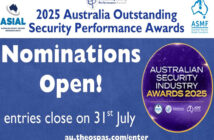
Senior retired defence and security personnel are calling on all Australian political parties to make the security risks posed by climate change a key focus in the upcoming federal election and to commit to a comprehensive Climate Security Risk Assessment if elected, in an open letter published in a full-page advertisement in The Australian newspaper on Wednesday.
The statement, issued by the Australian Security Leaders Climate Group (ASLCG) and signed by seventeen senior former defence and security personnel including former Defence Force Chief Admiral Chris Barrie (Retd), says that “the first duty of government is to protect the people, but on climate–security risks, Australia is ‘missing in action’”.
The invasion of Ukraine has also shown the fragility of energy supplies as energy prices surge, and demonstrates the need for more renewable energy as a national security imperative, according to former Deputy Chief of the Royal Australian Air Force Air Vice-Marshal John Blackburn (Retd), another signatory to the open letter and an ASLCG Executive Member.
“Renewables are critical to energy supply resilience and national security in a more unstable world,” said Air Vice-Marshal Blackburn.
It’s not climate ‘versus’ security, it’s climate ‘and’ security
The former defence leaders warn “hotter and more extreme weather, floods, cyclones, bushfires and heatwaves, together with rising sea levels, are threatening our water, transport, food and critical infrastructure systems, disrupting supply chains, driving up prices and undermining our resilience as a nation”.
According to Admiral Barrie (Retd), climate change has previously contributed to concurrent wheat crop failures in Ukraine, Russia, China and Australia which led to rising food prices in countries around the world and became a key trigger for the Arab Spring and regional instability.
“Now high energy and food prices triggered by the Ukraine invasion could contribute to social unrest in countries as far apart as Egypt and Indonesia, which is right on Australia’s doorstep,” Admiral Barrie said.
“Climate change will only make these kinds of occurrences more frequent and, unless our political leaders take urgent action, we can expect to see increasing instability, conflict and forced migration from neighbouring nations and within our region. It is not a matter of ‘climate versus security’ as has recently been suggested, but ‘climate and security’.”
Col Neil Greet (Rtd), who was involved as a serving officer in the Black Saturday bushfire response, said: “The ADF should not be the force of choice for disaster response. It is not the best suited institution for disaster response, nor is it a substitute for nationally coordinated civilian-led rapid response infrastructure”.
Responsibility as a global citizen
Professor John Blaxland, former Australian Army Colonel and signatory to the open letter, said: “Addressing climate-security challenges requires global cooperation rather than conflict. While our major allies, including the US and the UK, are taking action, the Australian government has not fully assessed or understood the security risks posed by climate change.
“As a result, we are ill-prepared for the challenges we are already facing, we are not playing our part as a strategic defence ally and we are failing in our responsibilities as a global citizen.”
Ukraine war highlights need for more renewables for Australian energy security
Air Vice-Marshal John Blackburn (Retd) said that Australia has an opportunity with electric and hydrogen vehicles to build a nation powered by energy made on our own soil, especially since we have little more than a month’s supply of fuel currently in Australia.
“Renewables makes Australia’s energy supply more resilient, and is absolutely necessary to stopping worsening climate change, to help prevent conflicts and people displacement triggered by increasingly devastating climate impacts from overwhelming the defence forces’ capacity to keep Australians safe.”
A full copy of the open letter is available here: https://www.aslcg.org/open-letter






